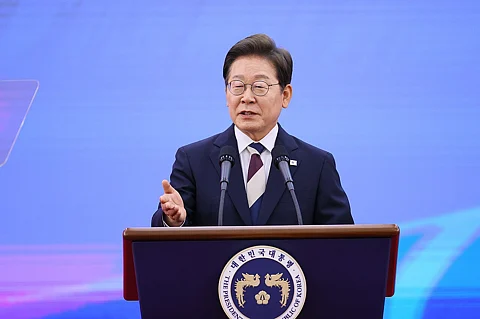

South Korean President Lee Jae-myung vowed on Friday to prioritize easing regulations and expediting tariff negotiations with the U.S. as part of broader efforts to support businesses facing global trade challenges.
Speaking at a meeting with top corporate leaders—including Samsung Electronics Chairman Jay Y. Lee and Hyundai Motor Group Executive Chair Euisun Chung—President Lee emphasized the need to bolster South Korea’s export-driven economy. Key sectors such as semiconductors, automobiles, and shipbuilding remain highly vulnerable to shifting trade policies.
"Companies are struggling in international competition, and we will focus on minimizing their difficulties while expanding their economic opportunities," Lee said, according to his spokesperson, Kang Yu-jung. The president pledged a "pragmatic, flexible" trade policy, with national interests at the forefront.
SK Group Chairman Chey Tae-won, who also heads the Korea Chamber of Commerce, warned that uncertainty around U.S. tariffs has made it difficult for firms to plan investments. Samsung’s Jay Y. Lee described the current challenges as a "multi-dimensional crisis," urging stronger public-private cooperation.
The meeting came as Seoul and Washington work to revive trade discussions following a leadership transition in South Korea. Last week, President Lee and U.S. President Donald Trump agreed in a phone call to pursue a swift trade deal.
Meanwhile, South Korea’s Deputy Minister for Economic Affairs, Kim Hee-sang, met with U.S. State Department official Sean O’Neill on Friday, reaffirming bilateral ties. O’Neill highlighted potential collaboration in shipbuilding, economic security, and mutual investment.
With Trump considering further auto tariff hikes, South Korea’s trade-dependent economy faces mounting pressure. The government said it would assess the impact of U.S. duties on home appliance manufacturers and prepare support measures.
President Lee, who took office on June 3 after a pro-business campaign, faces a delicate balancing act—supporting corporate growth while addressing public skepticism over the influence of family-run conglomerates, or chaebols.
At the meeting, Lee urged business leaders to help restore market trust, acknowledging lingering public distrust of corporate power. However, immediate concerns over trade protectionism dominated discussions, with executives warning of ripple effects from U.S.-China tensions and weak domestic demand.
As Lee prepares to attend the G7 summit in Canada, his administration is under pressure to secure favorable trade terms while navigating Trump’s aggressive tariff policies. Hyundai Motor’s planned $21 billion U.S. investment could serve as leverage in negotiations, but auto tariffs remain a critical hurdle.
With reciprocal tariffs set to take effect next month, both sides are racing to finalize a deal that safeguards South Korea’s export-driven growth.